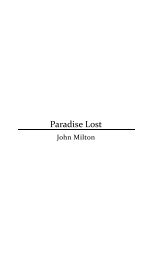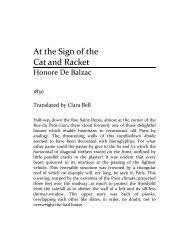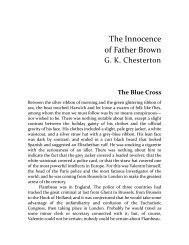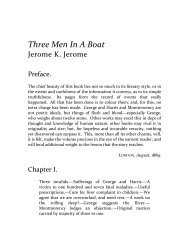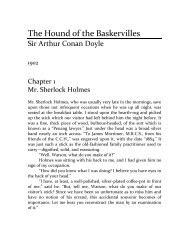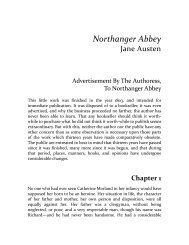Kurt Vonnegut Jr - Two Stories.pdf - Bookstacks
Kurt Vonnegut Jr - Two Stories.pdf - Bookstacks
Kurt Vonnegut Jr - Two Stories.pdf - Bookstacks
You also want an ePaper? Increase the reach of your titles
YUMPU automatically turns print PDFs into web optimized ePapers that Google loves.
<strong>Two</strong> Short <strong>Stories</strong><br />
<strong>Kurt</strong> <strong>Vonnegut</strong>, <strong>Jr</strong>.
The Big Trip Up Yonder<br />
If it was good enough for your grandfather, forget it ... it<br />
is much too good for anyone else!<br />
G<br />
ramps Ford, his chin resting on his hands, his hands on the crook of his<br />
cane, was staring irascibly at the five-foot television screen that dominated<br />
the room. On the screen, a news commentator was summarizing the day’s<br />
happenings. Every thirty seconds or so, Gramps would jab the floor with his canetip<br />
and shout, “Hell, we did that a hundred years ago!”<br />
Emerald and Lou, coming in from the balcony, where they had been seeking<br />
that 2185 A.D. rarity—privacy—were obliged to take seats in the back row, behind<br />
Lou’s father and mother, brother and sister-in-law, son and daughter-in-law,<br />
grandson and wife, granddaughter and husband, great-grandson and wife, nephew<br />
and wife, grandnephew and wife, great-grandniece and husband, greatgrandnephew<br />
and wife—and, of course, Gramps, who was in front of everybody.<br />
All save Gramps, who was somewhat withered and bent, seemed, by pre-antigerasone<br />
standards, to be about the same age—somewhere in their late twenties or<br />
early thirties. Gramps looked older because he had already reached 70 when antigerasone<br />
was invented. He had not aged in the 102 years since.<br />
“Meanwhile,” the commentator was saying, “Council Bluffs, Iowa, was still<br />
threatened by stark tragedy. But 200 weary rescue workers have refused to give up<br />
hope, and continue to dig in an effort to save Elbert Haggedorn, 183, who has been<br />
wedged for two days in a ...”<br />
“I wish he’d get something more cheerful,” Emerald whispered to Lou.<br />
* * * * *<br />
“Silence!” cried Gramps. “Next one shoots off his big bazoo while the TV’s<br />
on is gonna find hisself cut off without a dollar—” his voice suddenly softened and<br />
sweetened—”when they wave that checkered flag at the Indianapolis Speedway,<br />
and old Gramps gets ready for the Big Trip Up Yonder.”<br />
He sniffed sentimentally, while his heirs concentrated desperately on not<br />
making the slightest sound. For them, the poignancy of the prospective Big Trip<br />
had been dulled somewhat, through having been mentioned by Gramps about<br />
once a day for fifty years.
TWO SHORT STORIES KURT VONNEGUT, JR.<br />
“Dr. Brainard Keyes Bullard,” continued the commentator, “President of<br />
Wyandotte College, said in an address tonight that most of the world’s ills can be<br />
traced to the fact that Man’s knowledge of himself has not kept pace with his<br />
knowledge of the physical world.”<br />
“Hell!” snorted Gramps. “We said that a hundred years ago!”<br />
“In Chicago tonight,” the commentator went on, “a special celebration is<br />
taking place in the Chicago Lying-in Hospital. The guest of honor is Lowell W.<br />
Hitz, age zero. Hitz, born this morning, is the twenty-five-millionth child to be<br />
born in the hospital.” The commentator faded, and was replaced on the screen by<br />
young Hitz, who squalled furiously.<br />
“Hell!” whispered Lou to Emerald. “We said that a hundred years ago.”<br />
“I heard that!” shouted Gramps. He snapped off the television set and his<br />
petrified descendants stared silently at the screen. “You, there, boy—”<br />
“I didn’t mean anything by it, sir,” said Lou, aged 103.<br />
“Get me my will. You know where it is. You kids all know where it is. Fetch,<br />
boy!” Gramps snapped his gnarled fingers sharply.<br />
Lou nodded dully and found himself going down the hall, picking his way<br />
over bedding to Gramps’ room, the only private room in the Ford apartment. The<br />
other rooms were the bathroom, the living room and the wide windowless hallway,<br />
which was originally intended to serve as a dining area, and which had a<br />
kitchenette in one end. Six mattresses and four sleeping bags were dispersed in the<br />
hallway and living room, and the daybed, in the living room, accommodated the<br />
eleventh couple, the favorites of the moment.<br />
On Gramps’ bureau was his will, smeared, dog-eared, perforated and<br />
blotched with hundreds of additions, deletions, accusations, conditions, warnings,<br />
advice and homely philosophy. The document was, Lou reflected, a fifty-year diary,<br />
all jammed onto two sheets—a garbled, illegible log of day after day of strife. This<br />
day, Lou would be disinherited for the eleventh time, and it would take him<br />
perhaps six months of impeccable behavior to regain the promise of a share in the<br />
estate. To say nothing of the daybed in the living room for Em and himself.<br />
“Boy!” called Gramps.<br />
“Coming, sir.” Lou hurried back into the living room and handed Gramps<br />
the will.<br />
“Pen!” said Gramps.<br />
* * * * *<br />
He was instantly offered eleven pens, one from each couple.<br />
“Not that leaky thing,” he said, brushing Lou’s pen aside. “Ah, there’s a nice<br />
one. Good boy, Willy.” He accepted Willy’s pen. That was the tip they had all been<br />
waiting for. Willy, then—Lou’s father—was the new favorite.<br />
3
TWO SHORT STORIES KURT VONNEGUT, JR.<br />
Willy, who looked almost as young as Lou, though he was 142, did a poor<br />
job of concealing his pleasure. He glanced shyly at the daybed, which would<br />
become his, and from which Lou and Emerald would have to move back into the<br />
hall, back to the worst spot of all by the bathroom door.<br />
Gramps missed none of the high drama he had authored and he gave his<br />
own familiar role everything he had. Frowning and running his finger along each<br />
line, as though he were seeing the will for the first time, he read aloud in a deep<br />
portentous monotone, like a bass note on a cathedral organ.<br />
“I, Harold D. Ford, residing in Building 257 of Alden Village, New York City,<br />
Connecticut, do hereby make, publish and declare this to be my last Will and<br />
Testament, revoking any and all former wills and codicils by me at any time<br />
heretofore made.” He blew his nose importantly and went on, not missing a word,<br />
and repeating many for emphasis—repeating in particular his ever-more-elaborate<br />
specifications for a funeral.<br />
At the end of these specifications, Gramps was so choked with emotion that<br />
Lou thought he might have forgotten why he’d brought out the will in the first<br />
place. But Gramps heroically brought his powerful emotions under control and,<br />
after erasing for a full minute, began to write and speak at the same time. Lou<br />
could have spoken his lines for him, he had heard them so often.<br />
“I have had many heartbreaks ere leaving this vale of tears for a better land,”<br />
Gramps said and wrote. “But the deepest hurt of all has been dealt me by—” He<br />
looked around the group, trying to remember who the malefactor was.<br />
Everyone looked helpfully at Lou, who held up his hand resignedly.<br />
Gramps nodded, remembering, and completed the sentence—”my greatgrandson,<br />
Louis J. Ford.”<br />
“Grandson, sir,” said Lou.<br />
“Don’t quibble. You’re in deep enough now, young man,” said Gramps, but<br />
he made the change. And, from there, he went without a misstep through the<br />
phrasing of the disinheritance, causes for which were disrespectfulness and<br />
quibbling.<br />
* * * * *<br />
In the paragraph following, the paragraph that had belonged to everyone in<br />
the room at one time or another, Lou’s name was scratched out and Willy’s<br />
substituted as heir to the apartment and, the biggest plum of all, the double bed in<br />
the private bedroom.<br />
“So!” said Gramps, beaming. He erased the date at the foot of the will and<br />
substituted a new one, including the time of day. “Well—time to watch the<br />
McGarvey Family.” The McGarvey Family was a television serial that Gramps had<br />
been following since he was 60, or for a total of 112 years. “I can’t wait to see what’s<br />
going to happen next,” he said.<br />
4
TWO SHORT STORIES KURT VONNEGUT, JR.<br />
Lou detached himself from the group and lay down on his bed of pain by<br />
the bathroom door. Wishing Em would join him, he wondered where she was.<br />
He dozed for a few moments, until he was disturbed by someone stepping<br />
over him to get into the bathroom. A moment later, he heard a faint gurgling<br />
sound, as though something were being poured down the washbasin drain.<br />
Suddenly, it entered his mind that Em had cracked up, that she was in there doing<br />
something drastic about Gramps.<br />
“Em?” he whispered through the panel. There was no reply, and Lou pressed<br />
against the door. The worn lock, whose bolt barely engaged its socket, held for a<br />
second, then let the door swing inward.<br />
“Morty!” gasped Lou.<br />
Lou’s great-grandnephew, Mortimer, who had just married and brought his<br />
wife home to the Ford menage, looked at Lou with consternation and surprise.<br />
Morty kicked the door shut, but not before Lou had glimpsed what was in his<br />
hand—Gramps’ enormous economy-size bottle of anti-gerasone, which had<br />
apparently been half-emptied, and which Morty was refilling with tap water.<br />
A moment later, Morty came out, glared defiantly at Lou and brushed past<br />
him wordlessly to rejoin his pretty bride.<br />
Shocked, Lou didn’t know what to do. He couldn’t let Gramps take the<br />
mousetrapped anti-gerasone—but, if he warned Gramps about it, Gramps would<br />
certainly make life in the apartment, which was merely insufferable now,<br />
harrowing.<br />
Lou glanced into the living room and saw that the Fords, Emerald among<br />
them, were momentarily at rest, relishing the botches that the McGarveys had<br />
made of their lives. Stealthily, he went into the bathroom, locked the door as well<br />
as he could and began to pour the contents of Gramps’ bottle down the drain. He<br />
was going to refill it with full-strength anti-gerasone from the 22 smaller bottles on<br />
the shelf.<br />
The bottle contained a half-gallon, and its neck was small, so it seemed to<br />
Lou that the emptying would take forever. And the almost imperceptible smell of<br />
anti-gerasone, like Worcestershire sauce, now seemed to Lou, in his nervousness,<br />
to be pouring out into the rest of the apartment, through the keyhole and under<br />
the door.<br />
* * * * *<br />
The bottle gurgled monotonously. Suddenly, up came the sound of music<br />
from the living room and there were murmurs and the scraping of chair-legs on<br />
the floor. “Thus ends,” said the television announcer, “the 29,121st chapter in the<br />
life of your neighbors and mine, the McGarveys.” Footsteps were coming down the<br />
hall. There was a knock on the bathroom door.<br />
5
TWO SHORT STORIES KURT VONNEGUT, JR.<br />
“Just a sec,” Lou cheerily called out. Desperately, he shook the big bottle,<br />
trying to speed up the flow. His palms slipped on the wet glass, and the heavy<br />
bottle smashed on the tile floor.<br />
The door was pushed open, and Gramps, dumbfounded, stared at the<br />
incriminating mess.<br />
Lou felt a hideous prickling sensation on his scalp and the back of his neck.<br />
He grinned engagingly through his nausea and, for want of anything remotely<br />
resembling a thought, waited for Gramps to speak.<br />
“Well, boy,” said Gramps at last, “looks like you’ve got a little tidying up to<br />
do.”<br />
And that was all he said. He turned around, elbowed his way through the<br />
crowd and locked himself in his bedroom.<br />
The Fords contemplated Lou in incredulous silence a moment longer, and<br />
then hurried back to the living room, as though some of his horrible guilt would<br />
taint them, too, if they looked too long. Morty stayed behind long enough to give<br />
Lou a quizzical, annoyed glance. Then he also went into the living room, leaving<br />
only Emerald standing in the doorway.<br />
Tears streamed over her cheeks. “Oh, you poor lamb—please don’t look so<br />
awful! It was my fault. I put you up to this with my nagging about Gramps.”<br />
“No,” said Lou, finding his voice, “really you didn’t. Honest, Em, I was<br />
just—”<br />
“You don’t have to explain anything to me, hon. I’m on your side, no matter<br />
what.” She kissed him on one cheek and whispered in his ear, “It wouldn’t have<br />
been murder, hon. It wouldn’t have killed him. It wasn’t such a terrible thing to do.<br />
It just would have fixed him up so he’d be able to go any time God decided He<br />
wanted him.”<br />
“What’s going to happen next, Em?” said Lou hollowly. “What’s he going to<br />
do?”<br />
* * * * *<br />
Lou and Emerald stayed fearfully awake almost all night, waiting to see<br />
what Gramps was going to do. But not a sound came from the sacred bedroom.<br />
<strong>Two</strong> hours before dawn, they finally dropped off to sleep.<br />
At six o’clock, they arose again, for it was time for their generation to eat<br />
breakfast in the kitchenette. No one spoke to them. They had twenty minutes in<br />
which to eat, but their reflexes were so dulled by the bad night that they had<br />
hardly swallowed two mouthfuls of egg-type processed seaweed before it was time<br />
to surrender their places to their son’s generation.<br />
Then, as was the custom for whoever had been most recently disinherited,<br />
they began preparing Gramps’ breakfast, which would presently be served to him<br />
in bed, on a tray. They tried to be cheerful about it. The toughest part of the job<br />
6
TWO SHORT STORIES KURT VONNEGUT, JR.<br />
was having to handle the honest-to-God eggs and bacon and oleomargarine, on<br />
which Gramps spent so much of the income from his fortune.<br />
“Well,” said Emerald, “I’m not going to get all panicky until I’m sure there’s<br />
something to be panicky about.”<br />
“Maybe he doesn’t know what it was I busted,” Lou said hopefully.<br />
“Probably thinks it was your watch crystal,” offered Eddie, their son, who<br />
was toying apathetically with his buckwheat-type processed sawdust cakes.<br />
“Don’t get sarcastic with your father,” said Em, “and don’t talk with your<br />
mouth full, either.”<br />
“I’d like to see anybody take a mouthful of this stuff and not say something,”<br />
complained Eddie, who was 73. He glanced at the clock. “It’s time to take Gramps<br />
his breakfast, you know.”<br />
“Yeah, it is, isn’t it?” said Lou weakly. He shrugged. “Let’s have the tray,<br />
Em.”<br />
“We’ll both go.”<br />
Walking slowly, smiling bravely, they found a large semi-circle of longfaced<br />
Fords standing around the bedroom door.<br />
Em knocked. “Gramps,” she called brightly, “break-fast is rea-dy.”<br />
There was no reply and she knocked again, harder.<br />
The door swung open before her fist. In the middle of the room, the soft,<br />
deep, wide, canopied bed, the symbol of the sweet by-and-by to every Ford, was<br />
empty.<br />
A sense of death, as unfamiliar to the Fords as Zoroastrianism or the causes<br />
of the Sepoy Mutiny, stilled every voice, slowed every heart. Awed, the heirs began<br />
to search gingerly, under the furniture and behind the drapes, for all that was<br />
mortal of Gramps, father of the clan.<br />
* * * * *<br />
But Gramps had left not his Earthly husk but a note, which Lou finally<br />
found on the dresser, under a paperweight which was a treasured souvenir from<br />
the World’s Fair of 2000. Unsteadily, Lou read it aloud:<br />
“‘Somebody who I have sheltered and protected and taught the best I<br />
know how all these years last night turned on me like a mad dog and<br />
diluted my anti-gerasone, or tried to. I am no longer a young man. I<br />
can no longer bear the crushing burden of life as I once could. So,<br />
after last night’s bitter experience, I say good-by. The cares of this<br />
world will soon drop away like a cloak of thorns and I shall know<br />
peace. By the time you find this, I will be gone.’”<br />
7
TWO SHORT STORIES KURT VONNEGUT, JR.<br />
“Gosh,” said Willy brokenly, “he didn’t even get to see how the 5000-mile<br />
Speedway Race was going to come out.”<br />
“Or the Solar Series,” Eddie said, with large mournful eyes.<br />
“Or whether Mrs. McGarvey got her eyesight back,” added Morty.<br />
“There’s more,” said Lou, and he began reading aloud again: “‘I, Harold D.<br />
Ford, etc., do hereby make, publish and declare this to be my last Will and<br />
Testament, revoking any and all former wills and codicils by me at any time<br />
heretofore made.’“<br />
“No!” cried Willy. “Not another one!”<br />
“‘I do stipulate,’“ read Lou, “‘that all of my property, of whatsoever kind and<br />
nature, not be divided, but do devise and bequeath it to be held in common by my<br />
issue, without regard for generation, equally, share and share alike.’“<br />
“Issue?” said Emerald.<br />
Lou included the multitude in a sweep of his hand. “It means we all own the<br />
whole damn shootin’ match.”<br />
Each eye turned instantly to the bed.<br />
“Share and share alike?” asked Morty.<br />
“Actually,” said Willy, who was the oldest one present, “it’s just like the old<br />
system, where the oldest people head up things with their headquarters in here<br />
and—”<br />
“I like that!” exclaimed Em. “Lou owns as much of it as you do, and I say it<br />
ought to be for the oldest one who’s still working. You can snooze around here all<br />
day, waiting for your pension check, while poor Lou stumbles in here after work,<br />
all tuckered out, and—”<br />
“How about letting somebody who’s never had any privacy get a little crack<br />
at it?” Eddie demanded hotly. “Hell, you old people had plenty of privacy back<br />
when you were kids. I was born and raised in the middle of that goddamn barracks<br />
in the hall! How about—”<br />
“Yeah?” challenged Morty. “Sure, you’ve all had it pretty tough, and my<br />
heart bleeds for you. But try honeymooning in the hall for a real kick.”<br />
“Silence!” shouted Willy imperiously. “The next person who opens his<br />
mouth spends the next sixth months by the bathroom. Now clear out of my room.<br />
I want to think.”<br />
A vase shattered against the wall, inches above his head.<br />
* * * * *<br />
In the next moment, a free-for-all was under way, with each couple battling<br />
to eject every other couple from the room. Fighting coalitions formed and<br />
dissolved with the lightning changes of the tactical situation. Em and Lou were<br />
thrown into the hall, where they organized others in the same situation, and<br />
stormed back into the room.<br />
8
TWO SHORT STORIES KURT VONNEGUT, JR.<br />
After two hours of struggle, with nothing like a decision in sight, the cops<br />
broke in, followed by television cameramen from mobile units.<br />
For the next half-hour, patrol wagons and ambulances hauled away Fords,<br />
and then the apartment was still and spacious.<br />
An hour later, films of the last stages of the riot were being televised to<br />
500,000,000 delighted viewers on the Eastern Seaboard.<br />
In the stillness of the three-room Ford apartment on the 76th floor of<br />
Building 257, the television set had been left on. Once more the air was filled with<br />
the cries and grunts and crashes of the fray, coming harmlessly now from the<br />
loudspeaker.<br />
The battle also appeared on the screen of the television set in the police<br />
station, where the Fords and their captors watched with professional interest.<br />
Em and Lou, in adjacent four-by-eight cells, were stretched out peacefully<br />
on their cots.<br />
“Em,” called Lou through the partition, “you got a washbasin all your own,<br />
too?”<br />
“Sure. Washbasin, bed, light—the works. And we thought Gramps’ room<br />
was something. How long has this been going on?” She held out her hand. “For the<br />
first time in forty years, hon, I haven’t got the shakes—look at me!”<br />
“Cross your fingers,” said Lou. “The lawyer’s going to try to get us a year.”<br />
“Gee!” Em said dreamily. “I wonder what kind of wires you’d have to pull to<br />
get put away in solitary?”<br />
“All right, pipe down,” said the turnkey, “or I’ll toss the whole kit and<br />
caboodle of you right out. And first one who lets on to anybody outside how good<br />
jail is ain’t never getting back in!”<br />
The prisoners instantly fell silent.<br />
* * * * *<br />
The living room of the apartment darkened for a moment as the riot scenes<br />
faded on the television screen, and then the face of the announcer appeared, like<br />
the Sun coming from behind a cloud. “And now, friends,” he said, “I have a special<br />
message from the makers of anti-gerasone, a message for all you folks over 150. Are<br />
you hampered socially by wrinkles, by stiffness of joints and discoloration or loss<br />
of hair, all because these things came upon you before anti-gerasone was<br />
developed? Well, if you are, you need no longer suffer, need no longer feel<br />
different and out of things.<br />
“After years of research, medical science has now developed Super-antigerasone!<br />
In weeks—yes, weeks—you can look, feel and act as young as your greatgreat-grandchildren!<br />
Wouldn’t you pay $5,000 to be indistinguishable from<br />
everybody else? Well, you don’t have to. Safe, tested Super-anti-gerasone costs you<br />
only a few dollars a day.<br />
9
TWO SHORT STORIES KURT VONNEGUT, JR.<br />
“Write now for your free trial carton. Just put your name and address on a<br />
dollar postcard, and mail it to ‘Super,’ Box 500,000, Schenectady, N. Y. Have you<br />
got that? I’ll repeat it. ‘Super,’ Box 500,000 ...”<br />
Underlining the announcer’s words was the scratching of Gramps’ pen, the<br />
one Willy had given him the night before. He had come in, a few minutes earlier,<br />
from the Idle Hour Tavern, which commanded a view of Building 257 from across<br />
the square of asphalt known as the Alden Village Green. He had called a cleaning<br />
woman to come straighten the place up, then had hired the best lawyer in town to<br />
get his descendants a conviction, a genius who had never gotten a client less than<br />
a year and a day. Gramps had then moved the daybed before the television screen,<br />
so that he could watch from a reclining position. It was something he’d dreamed of<br />
doing for years.<br />
“Schen-ec-ta-dy,” murmured Gramps. “Got it!” His face had changed<br />
remarkably. His facial muscles seemed to have relaxed, revealing kindness and<br />
equanimity under what had been taut lines of bad temper. It was almost as though<br />
his trial package of Super-anti-gerasone had already arrived. When something<br />
amused him on television, he smiled easily, rather than barely managing to<br />
lengthen the thin line of his mouth a millimeter.<br />
Life was good. He could hardly wait to see what was going to happen next.<br />
10
2BR02B<br />
E<br />
verything was perfectly swell.<br />
There were no prisons, no slums, no insane asylums, no cripples, no<br />
poverty, no wars.<br />
All diseases were conquered. So was old age.<br />
Death, barring accidents, was an adventure for volunteers.<br />
The population of the United States was stabilized at forty-million souls.<br />
One bright morning in the Chicago Lying-in Hospital, a man named<br />
Edward K. Wehling, <strong>Jr</strong>., waited for his wife to give birth. He was the only man<br />
waiting. Not many people were born a day any more.<br />
Wehling was fifty-six, a mere stripling in a population whose average age<br />
was one hundred and twenty-nine.<br />
X-rays had revealed that his wife was going to have triplets. The children<br />
would be his first.<br />
Young Wehling was hunched in his chair, his head in his hand. He was so<br />
rumpled, so still and colorless as to be virtually invisible. His camouflage was<br />
perfect, since the waiting room had a disorderly and demoralized air, too. Chairs<br />
and ashtrays had been moved away from the walls. The floor was paved with<br />
spattered dropcloths.<br />
The room was being redecorated. It was being redecorated as a memorial to<br />
a man who had volunteered to die.<br />
A sardonic old man, about two hundred years old, sat on a stepladder,<br />
painting a mural he did not like. Back in the days when people aged visibly, his age<br />
would have been guessed at thirty-five or so. Aging had touched him that much<br />
before the cure for aging was found.<br />
The mural he was working on depicted a very neat garden. Men and women<br />
in white, doctors and nurses, turned the soil, planted seedlings, sprayed bugs,<br />
spread fertilizer.<br />
Men and women in purple uniforms pulled up weeds, cut down plants that<br />
were old and sickly, raked leaves, carried refuse to trash-burners.<br />
Never, never, never—not even in medieval Holland nor old Japan—had a<br />
garden been more formal, been better tended. Every plant had all the loam, light,<br />
water, air and nourishment it could use.<br />
A hospital orderly came down the corridor, singing under his breath a<br />
popular song:
TWO SHORT STORIES KURT VONNEGUT, JR.<br />
If you don’t like my kisses, honey,<br />
Here’s what I will do:<br />
I’ll go see a girl in purple,<br />
Kiss this sad world toodle-oo.<br />
If you don’t want my lovin’,<br />
Why should I take up all this space?<br />
I’ll get off this old planet,<br />
Let some sweet baby have my place.<br />
The orderly looked in at the mural and the muralist. “Looks so real,” he<br />
said, “I can practically imagine I’m standing in the middle of it.”<br />
“What makes you think you’re not in it?” said the painter. He gave a satiric<br />
smile. “It’s called ‘The Happy Garden of Life,’ you know.”<br />
“That’s good of Dr. Hitz,” said the orderly.<br />
* * * * *<br />
He was referring to one of the male figures in white, whose head was a<br />
portrait of Dr. Benjamin Hitz, the hospital’s Chief Obstetrician. Hitz was a<br />
blindingly handsome man.<br />
“Lot of faces still to fill in,” said the orderly. He meant that the faces of<br />
many of the figures in the mural were still blank. All blanks were to be filled with<br />
portraits of important people on either the hospital staff or from the Chicago<br />
Office of the Federal Bureau of Termination.<br />
“Must be nice to be able to make pictures that look like something,” said<br />
the orderly.<br />
The painter’s face curdled with scorn. “You think I’m proud of this daub?”<br />
he said. “You think this is my idea of what life really looks like?”<br />
“What’s your idea of what life looks like?” said the orderly.<br />
The painter gestured at a foul dropcloth. “There’s a good picture of it,” he<br />
said. “Frame that, and you’ll have a picture a damn sight more honest than this<br />
one.”<br />
“You’re a gloomy old duck, aren’t you?” said the orderly.<br />
“Is that a crime?” said the painter.<br />
The orderly shrugged. “If you don’t like it here, Grandpa—” he said, and he<br />
finished the thought with the trick telephone number that people who didn’t want<br />
to live any more were supposed to call. The zero in the telephone number he<br />
pronounced “naught.”<br />
The number was: “2 B R 0 2 B.”<br />
It was the telephone number of an institution whose fanciful sobriquets<br />
included: “Automat,” “Birdland,” “Cannery,” “Catbox,” “De-louser,” “Easy-go,”<br />
12
TWO SHORT STORIES KURT VONNEGUT, JR.<br />
“Good-by, Mother,” “Happy Hooligan,” “Kiss-me-quick,” “Lucky Pierre,”<br />
“Sheepdip,” “Waring Blendor,” “Weep-no-more” and “Why Worry?”<br />
“To be or not to be” was the telephone number of the municipal gas<br />
chambers of the Federal Bureau of Termination.<br />
* * * * *<br />
The painter thumbed his nose at the orderly. “When I decide it’s time to<br />
go,” he said, “it won’t be at the Sheepdip.”<br />
“A do-it-yourselfer, eh?” said the orderly. “Messy business, Grandpa. Why<br />
don’t you have a little consideration for the people who have to clean up after<br />
you?”<br />
The painter expressed with an obscenity his lack of concern for the<br />
tribulations of his survivors. “The world could do with a good deal more mess, if<br />
you ask me,” he said.<br />
The orderly laughed and moved on.<br />
Wehling, the waiting father, mumbled something without raising his head.<br />
And then he fell silent again.<br />
A coarse, formidable woman strode into the waiting room on spike heels.<br />
Her shoes, stockings, trench coat, bag and overseas cap were all purple, the purple<br />
the painter called “the color of grapes on Judgment Day.”<br />
The medallion on her purple musette bag was the seal of the Service<br />
Division of the Federal Bureau of Termination, an eagle perched on a turnstile.<br />
The woman had a lot of facial hair—an unmistakable mustache, in fact. A<br />
curious thing about gas-chamber hostesses was that, no matter how lovely and<br />
feminine they were when recruited, they all sprouted mustaches within five years<br />
or so.<br />
“Is this where I’m supposed to come?” she said to the painter.<br />
“A lot would depend on what your business was,” he said. “You aren’t about<br />
to have a baby, are you?”<br />
“They told me I was supposed to pose for some picture,” she said. “My<br />
name’s Leora Duncan.” She waited.<br />
“And you dunk people,” he said.<br />
“What?” she said.<br />
“Skip it,” he said.<br />
“That sure is a beautiful picture,” she said. “Looks just like heaven or<br />
something.”<br />
“Or something,” said the painter. He took a list of names from his smock<br />
pocket. “Duncan, Duncan, Duncan,” he said, scanning the list. “Yes—here you are.<br />
You’re entitled to be immortalized. See any faceless body here you’d like me to<br />
stick your head on? We’ve got a few choice ones left.”<br />
13
TWO SHORT STORIES KURT VONNEGUT, JR.<br />
She studied the mural bleakly. “Gee,” she said, “they’re all the same to me. I<br />
don’t know anything about art.”<br />
“A body’s a body, eh?” he said, “All righty. As a master of fine art, I<br />
recommend this body here.” He indicated a faceless figure of a woman who was<br />
carrying dried stalks to a trash-burner.<br />
“Well,” said Leora Duncan, “that’s more the disposal people, isn’t it? I mean,<br />
I’m in service. I don’t do any disposing.”<br />
The painter clapped his hands in mock delight. “You say you don’t know<br />
anything about art, and then you prove in the next breath that you know more<br />
about it than I do! Of course the sheave-carrier is wrong for a hostess! A snipper, a<br />
pruner—that’s more your line.” He pointed to a figure in purple who was sawing a<br />
dead branch from an apple tree. “How about her?” he said. “You like her at all?”<br />
“Gosh—” she said, and she blushed and became humble—”that—that puts<br />
me right next to Dr. Hitz.”<br />
“That upsets you?” he said.<br />
“Good gravy, no!” she said. “It’s—it’s just such an honor.”<br />
“Ah, You admire him, eh?” he said.<br />
“Who doesn’t admire him?” she said, worshiping the portrait of Hitz. It was<br />
the portrait of a tanned, white-haired, omnipotent Zeus, two hundred and forty<br />
years old. “Who doesn’t admire him?” she said again. “He was responsible for<br />
setting up the very first gas chamber in Chicago.”<br />
“Nothing would please me more,” said the painter, “than to put you next to<br />
him for all time. Sawing off a limb—that strikes you as appropriate?”<br />
“That is kind of like what I do,” she said. She was demure about what she<br />
did. What she did was make people comfortable while she killed them.<br />
* * * * *<br />
And, while Leora Duncan was posing for her portrait, into the waitingroom<br />
bounded Dr. Hitz himself. He was seven feet tall, and he boomed with importance,<br />
accomplishments, and the joy of living.<br />
“Well, Miss Duncan! Miss Duncan!” he said, and he made a joke. “What are<br />
you doing here?” he said. “This isn’t where the people leave. This is where they<br />
come in!”<br />
“We’re going to be in the same picture together,” she said shyly.<br />
“Good!” said Dr. Hitz heartily. “And, say, isn’t that some picture?”<br />
“I sure am honored to be in it with you,” she said.<br />
“Let me tell you,” he said, “I’m honored to be in it with you. Without<br />
women like you, this wonderful world we’ve got wouldn’t be possible.”<br />
He saluted her and moved toward the door that led to the delivery rooms.<br />
“Guess what was just born,” he said.<br />
“I can’t,” she said.<br />
14
TWO SHORT STORIES KURT VONNEGUT, JR.<br />
“Triplets!” he said.<br />
“Triplets!” she said. She was exclaiming over the legal implications of<br />
triplets.<br />
The law said that no newborn child could survive unless the parents of the<br />
child could find someone who would volunteer to die. Triplets, if they were all to<br />
live, called for three volunteers.<br />
“Do the parents have three volunteers?” said Leora Duncan.<br />
“Last I heard,” said Dr. Hitz, “they had one, and were trying to scrape<br />
another two up.”<br />
“I don’t think they made it,” she said. “Nobody made three appointments<br />
with us. Nothing but singles going through today, unless somebody called in after I<br />
left. What’s the name?”<br />
“Wehling,” said the waiting father, sitting up, red-eyed and frowzy. “Edward<br />
K. Wehling, <strong>Jr</strong>., is the name of the happy father-to-be.”<br />
He raised his right hand, looked at a spot on the wall, gave a hoarsely<br />
wretched chuckle. “Present,” he said.<br />
“Oh, Mr. Wehling,” said Dr. Hitz, “I didn’t see you.”<br />
“The invisible man,” said Wehling.<br />
“They just phoned me that your triplets have been born,” said Dr. Hitz.<br />
“They’re all fine, and so is the mother. I’m on my way in to see them now.”<br />
“Hooray,” said Wehling emptily.<br />
“You don’t sound very happy,” said Dr. Hitz.<br />
“What man in my shoes wouldn’t be happy?” said Wehling. He gestured<br />
with his hands to symbolize care-free simplicity. “All I have to do is pick out which<br />
one of the triplets is going to live, then deliver my maternal grandfather to the<br />
Happy Hooligan, and come back here with a receipt.”<br />
* * * * *<br />
Dr. Hitz became rather severe with Wehling, towered over him. “You don’t<br />
believe in population control, Mr. Wehling?” he said.<br />
“I think it’s perfectly keen,” said Wehling tautly.<br />
“Would you like to go back to the good old days, when the population of<br />
the Earth was twenty billion—about to become forty billion, then eighty billion,<br />
then one hundred and sixty billion? Do you know what a drupelet is, Mr.<br />
Wehling?” said Hitz.<br />
“Nope,” said Wehling sulkily.<br />
“A drupelet, Mr. Wehling, is one of the little knobs, one of the little pulpy<br />
grains of a blackberry,” said Dr. Hitz. “Without population control, human beings<br />
would now be packed on this surface of this old planet like drupelets on a<br />
blackberry! Think of it!”<br />
Wehling continued to stare at the same spot on the wall.<br />
15
TWO SHORT STORIES KURT VONNEGUT, JR.<br />
“In the year 2000,” said Dr. Hitz, “before scientists stepped in and laid down<br />
the law, there wasn’t even enough drinking water to go around, and nothing to eat<br />
but sea-weed—and still people insisted on their right to reproduce like jackrabbits.<br />
And their right, if possible, to live forever.”<br />
“I want those kids,” said Wehling quietly. “I want all three of them.”<br />
“Of course you do,” said Dr. Hitz. “That’s only human.”<br />
“I don’t want my grandfather to die, either,” said Wehling.<br />
“Nobody’s really happy about taking a close relative to the Catbox,” said Dr.<br />
Hitz gently, sympathetically.<br />
“I wish people wouldn’t call it that,” said Leora Duncan.<br />
“What?” said Dr. Hitz.<br />
“I wish people wouldn’t call it ‘the Catbox,’ and things like that,” she said.<br />
“It gives people the wrong impression.”<br />
“You’re absolutely right,” said Dr. Hitz. “Forgive me.” He corrected himself,<br />
gave the municipal gas chambers their official title, a title no one ever used in<br />
conversation. “I should have said, ‘Ethical Suicide Studios,’“ he said.<br />
“That sounds so much better,” said Leora Duncan.<br />
“This child of yours—whichever one you decide to keep, Mr. Wehling,” said<br />
Dr. Hitz. “He or she is going to live on a happy, roomy, clean, rich planet, thanks<br />
to population control. In a garden like that mural there.” He shook his head. “<strong>Two</strong><br />
centuries ago, when I was a young man, it was a hell that nobody thought could<br />
last another twenty years. Now centuries of peace and plenty stretch before us as<br />
far as the imagination cares to travel.”<br />
He smiled luminously.<br />
The smile faded as he saw that Wehling had just drawn a revolver.<br />
Wehling shot Dr. Hitz dead. “There’s room for one—a great big one,” he<br />
said.<br />
And then he shot Leora Duncan. “It’s only death,” he said to her as she fell.<br />
“There! Room for two.”<br />
And then he shot himself, making room for all three of his children.<br />
Nobody came running. Nobody, seemingly, heard the shots.<br />
The painter sat on the top of his stepladder, looking down reflectively on<br />
the sorry scene.<br />
* * * * *<br />
The painter pondered the mournful puzzle of life demanding to be born<br />
and, once born, demanding to be fruitful ... to multiply and to live as long as<br />
possible—to do all that on a very small planet that would have to last forever.<br />
All the answers that the painter could think of were grim. Even grimmer,<br />
surely, than a Catbox, a Happy Hooligan, an Easy Go. He thought of war. He<br />
thought of plague. He thought of starvation.<br />
16
TWO SHORT STORIES KURT VONNEGUT, JR.<br />
He knew that he would never paint again. He let his paintbrush fall to the<br />
dropcloths below. And then he decided he had had about enough of life in the<br />
Happy Garden of Life, too, and he came slowly down from the ladder.<br />
He took Wehling’s pistol, really intending to shoot himself.<br />
But he didn’t have the nerve.<br />
And then he saw the telephone booth in the corner of the room. He went to<br />
it, dialed the well-remembered number: “2 B R 0 2 B.”<br />
“Federal Bureau of Termination,” said the very warm voice of a hostess.<br />
“How soon could I get an appointment?” he asked, speaking very carefully.<br />
“We could probably fit you in late this afternoon, sir,” she said. “It might<br />
even be earlier, if we get a cancellation.”<br />
“All right,” said the painter, “fit me in, if you please.” And he gave her his<br />
name, spelling it out.<br />
“Thank you, sir,” said the hostess. “Your city thanks you; your country<br />
thanks you; your planet thanks you. But the deepest thanks of all is from future<br />
generations.”<br />
END<br />
17
This eBook is completely free. It was produced for bookstacks.org on August 27,<br />
2010. Both this work, and its source material, are public domain.




